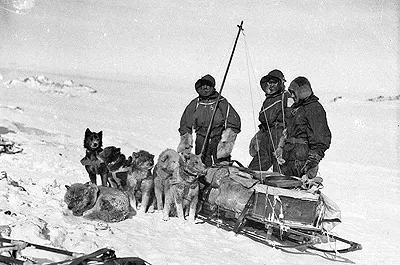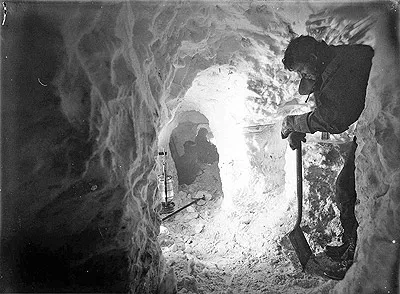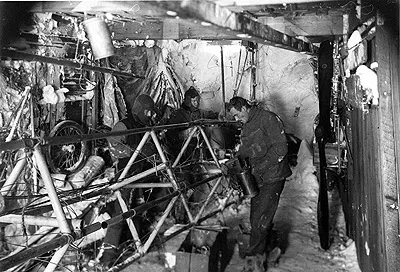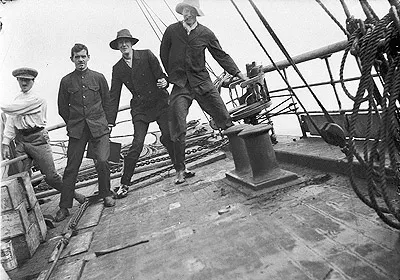Lt. Belgrave Edward Sutton Ninnis, 1887-1912
Biographical
notes
In charge of Greenland dogs - Aurora 1911-1913
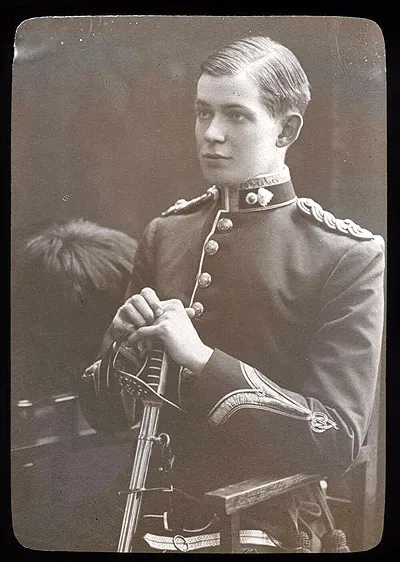
Single, was educated at Dulwich, England (as was Shackleton)
and entered His Majesty's Army, having a commission as Lieutenant
in the Royal Fusiliers prior to joining the Expedition in London.
At the Main Base (Adelie Land) he was assisted by X. Mertz in
the care of the Greenland dogs. On December 14, 1912, while
on a sledging journey, he lost his life by falling into a crevasse
three hundred miles east of Winter Quarters.
From Appendix
1, Mawson - Heart of the Antarctic
Belgrave Ninnis was part of a three man party with Douglas Mawson and Xavier Mertz who in the summer of 1912/13 made up the "Far Eastern Party" using dog teams to travel quickly to the east of the expedition base.
He lost his life on the 14th of December 1912 when he broke through the snow roof of a large crevasse he was crossing with the largest sledge, strongest dog team and much of the food including all the dog food. He was never seen or heard of again.
The loss of food and equipment with Ninnis led indirectly to the death of Mertz about three weeks later and the near-death of Mawson who managed to reach the safety of the base after a protracted and difficult ordeal. The expedition ship Aurora was forced to leave five men behind for another year to search for the missing three when it had to head north to escape the approaching winter.
References to Ninnis in Mawson's book "The Home of the Blizzard" buy USA buy UK
- Before the ship had reached Queen's Wharf, the berth
generously provided by the Harbour Board, the Greenland
dogs were transferred to the quarantine ground, and with
them went Dr. Mertz and Lieutenant Ninnis,
who gave up all their time during the stay in Hobart to
the care of those important animals.
- Ninnis and Mertz ran a tailoring business
for the dogs, who were brought one by one into the outer
Hut to be measured for harness. After many lengths had been
cut with scissors the canvas bands were put through and
sewn together on the large sewing-machine and then each
dog was fitted and the final alterations were made. The
huskies looked quite smart in their "suits".
- On the morning of August 11 Madigan and Ninnis
commenced to sink a deep vertical trench, at one end of
which a room was hewn out large enough to accommodate three
men. The job was finished on the following day, and we struck
the tent and moved to our new abode. The tent was spread
over the vertical shaft which served as the entrance. It
was a great relief to be in a strong room, with solid walls
of ice, in place of the cramped tent flapping violently
in the wind. Inside, the silence was profound; the blizzard
was banished. Aladdin's Cave it was dubbed - a truly
magical world of glassy facets and scintillating crystals.
- As the plans for the execution of such a journey had
of necessity to be more provisional than in the case of
the others, I determined to undertake it, accompanied by
Ninnis and Mertz, both of whom had so ably
acquitted themselves throughout the Expedition and, moreover,
had always been in charge of the dogs.
- Ninnis had a touch of snow-blindness
which rapidly improved under treatment. The stock cure for
this very irritating and painful affection is to place first
of all tiny "tabloids" of zinc sulphate and cocaine
hydrochloride under the eyelids where they quickly dissolve
in the tears, alleviating the smarting, "gritty"
sensation which is usually described by the sufferer. He
then bandages the eyes and escapes, if he is lucky, into
the darkness of his sleeping-bag.
- Into one of the fissures, bridged by snow, Ninnis's
sledge fell, but fortunately jammed itself just below the
surface. As it was, we had a long job getting it up again,
having to unpack the sledge in the crevasse until it was
light enough to be easily manipulated. Despite the delay,
our day's run was sixteen and a half miles.
- Often enough the dogs broke through the snow-bridges
on the morning of the 23rd, but only once were matters serious,
when Ninnis's sledge, doubtless on
account of its extra weight, again broke through a lid of
snow and was securely jammed in a crevasse just below the
surface.
- Mertz was well in advance of us when I noticed him hold
up his ski-stick and then go on. This was a signal for something
unusual so, as I approached the vicinity, I looked out for
crevasses or some other explanation of his action. As a
matter of fact crevasses were not expected, since we were
on a smooth surface of neve well to the southward of the
broken coastal slopes. On reaching the spot where Mertz
had signalled and seeing no sign of any irregularity, I
jumped on to the sledge, got out the book of tables and
commenced to figure out the latitude observation taken on
that day. Glancing at the ground a moment after, I noticed
the faint indication of a crevasse. It was but one of many
hundred similar ones we had crossed and had no specially
dangerous appearance, but still I turned quickly round,
called out a warning word to Ninnis and
then dismissed it from my thoughts.
Ninnis, who was walking along by the side of his sledge, close behind my own, heard the warning, for in my backward glance I noticed that he immediately swung the leading dogs so as to cross the crevasse squarely instead of diagonally as I had done. I then went on with my work.
There was no sound from behind except a faint, plaintive whine from one of the dogs which I imagined was in reply to a touch from Ninnis's whip. I remember addressing myself to George, the laziest dog in my own team, saying, "You will be getting a little of that, too, George, if you are not careful."
When I next looked back, it was in response to the anxious gaze of Mertz who had turned round and halted in his tracks. Behind me, nothing met the eye but my own sledge tracks running back in the distance. Where were Ninnis and his sledge? - Frantically waving to Mertz to bring up my sledge, upon
which there was some alpine rope, I leaned over and shouted
into the dark depths below. No sound came back but the moaning
of a dog, caught on a shelf just visible one hundred and
fifty feet below. The poor creature appeared to have broken
its back, for it was attempting to sit up with the front
part of its body while the hinder portion lay limp. Another
dog lay motionless by its side. Close by was what appeared
in the gloom to be the remains of the tent and a canvas
tank containing food for three men for a fortnight.
We broke back the edge of the neve lid and took turns leaning over secured by a rope, calling into the darkness in the hope that our companion might be still alive. For three hours we called unceasingly but no answering sound came back. The dog had ceased to moan and lay without a movement. A chill draught was blowing out of the abyss. We felt that there was little hope. - When comrades tramp the road to anywhere through a lonely
blizzard-ridden land in hunger, want and weariness the interests,
ties and fates of each are interwoven in a wondrous fabric
of friendship and affection. The shock of Ninnis's
death struck home and deeply stirred us.
He was a fine fellow and a born soldier - and the end:
At 9 P.M. we stood by the side of the crevasse and I read the burial service. Then Mertz shook me by the hand with a short "Thank you!" and we turned away to harness up the dogs.
Landmarks named after Lt. B.E.S. Ninnis
Feature Name:
Ninnis Glacier
Feature Type: glacier
Latitude:
68°22'S
Longitude: 147°00'E
Description: A large, heavily hummocked
and crevassed glacier descending steeply from the high interior
to the sea in a broad valley, on George V Coast. Discovered
by AAE (1911-14) under Douglas Mawson.
Feature Name:
Ninnis Glacier Tongue
Feature Type: glacier
Latitude:
68°05'S
Longitude: 147°45'E
Description: A broad glacier tongue
which forms the seaward extension of Ninnis Glacier. It was
recorded (1962) as projecting seaward about 30 miles. Discovered
by the AAE (1911-14) under Douglas Mawson and named after Ninnis
Glacier.
Variant Name Ninnis Glacier Ice
Tongue
Feature Name:
Mertz-Ninnis Valley
Feature Type: valley
Latitude:
67°25'S
Longitude: 146°00'E
Description: An undersea valley named
in association with the Mertz Glacier/Mertz Tongue and the Ninnis
Glacier/Ninnis Tongue. Name approved 12/71 (ACUF 132).
Variant Names: Adelie Depression / Mertz-Ninnis
Trough
Biographical information
- I am concentrating on the Polar experiences of the men involved.
Any further information or pictures visitors may have will be gratefully received.
Please email
- Paul Ward, webmaster.
What are the chances that my ancestor was an unsung part of the Heroic Age
of Antarctic Exploration?

